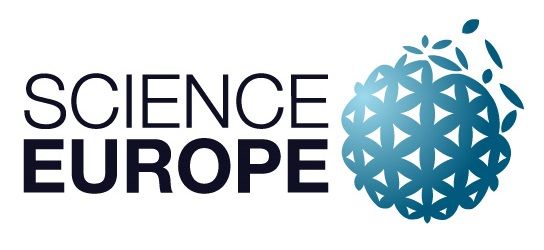Katharina Boguslawski, Karolina Ćwiek-Rogalska and Łukasz Opaliński are the three winners of the NCN Award, the highest distinction for early-stage researchers working in Poland. In 2023, the award will travel to Toruń, Warsaw, and Wrocław. The ceremony took place on 11 October at the Gallery of 19th-Century Polish Art in the Sukiennice.
Prof. Katharina Boguslawski is a quantum chemist working at the Nicolaus Copernicus University in Toruń, and was selected as the winner in Physical Sciences and Engineering. Dr Karolina Ćwiek-Rogalska, the winner in Arts, Humanities and Social Sciences, specialises in cultural studies, Czech studies and ethnology at the Institute of Slavic Studies at the Polish Academy of Sciences. Last but not least, the award for Life Sciences went to Prof. Łukasz Opaliński, a molecular biologist from the University of Wrocław.
The main criterion that guided the jury in the evaluation of the candidates and their achievements was their scientific excellence and international recognition. The award can be given to past and present NCN grant holders, but also to researchers who have never coordinated any NCN projects. This year, the jury chose from among 44 candidates nominated by the research community.
Checks for research
“Polish science is not yet lost so long as the NCN still lives”, said Prof. Zbigniew Błocki at the awards ceremony, “The NCN is an institution that gives early-stage researchers an opportunity to fast-track their careers and achieve research independence much earlier than would otherwise be possible in a reality that is not always auspicious and an environment that is highly hierarchical”, he added.
The acting director thanked all the researchers who have recently spoken out in defence of the NCN. “The existence of grant agencies that are completely independent of current politics and give the final say to researchers, rather than state officials, is a standard across the entire civilised world. Freedom is an absolute prerequisite for science.” Professor Błocki also commented on the situation of science in our country more generally: “We have observed dramatic cuts in research funding in proportion to what our country needs to continue to grow. And yet, year after year, the number of cheques publicly awarded for research funding and their figures continue to increase. This makes me think of a saying attributed to Alexis de Tocqueville, which is not really his: that "democracy will endure until the day the politicians discover that they can bribe the public with the public's money”, the director added.
A small breakthrough
This year, the NCN Award was given out for the 11th time. Among the 30 researchers who won it between 2013 and 2022, 25 were men and only 5 were women. “The award has been very male dominated thus far. This year, we have achieved a breakthrough, but, for now, it’s still only a breakthrough with a lowercase ‘b’”, says Prof. Robert Hasterok. This is the first year we have seen two women and only one man collect the award.
During the ceremony, the President of the NCN Council explained that as of next year, the terms and conditions of the award will change so as to implement a more stringent equality policy in the academic community. The most important change will have to do with the maximum age of the nominees. Until now, it was the chronological age that mattered (up to 40); from now on, the jury will take into account the nominee’s academic age (up to 12 years post-PhD) and make allowances for possible career breaks. The group of individuals eligible to nominate candidates will also be expanded. These changes were already passed by the NCN Council in mid-November 2022, but the ministry took more than 9 months until it finally approved them at the end of August 2023, which is why they will only come into force next year.
Achievements that are seen and appreciated
“This award gives me a sense that my research and achievements are really seen and appreciated within the Polish research community”, says Prof. Katharina Boguslawski.
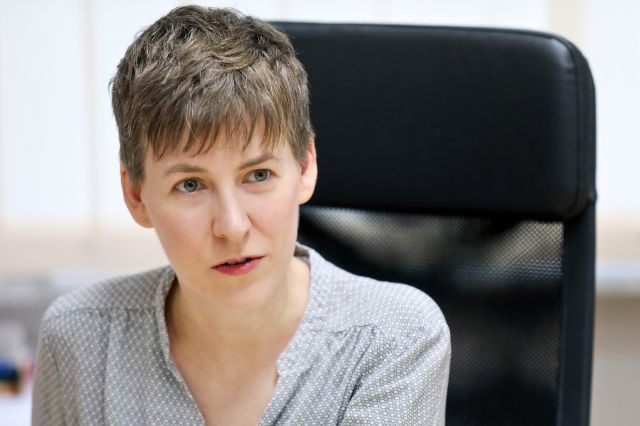 Katharina Boguslawski, fot. Andrzej Romański
Prof. Boguslawski is a quantum chemist, whose research combines chemistry, physics, mathematics and applied computer science. She focuses on developing innovative computing methods to model the properties of large chemical molecules without the need for experiments.
Katharina Boguslawski, fot. Andrzej Romański
Prof. Boguslawski is a quantum chemist, whose research combines chemistry, physics, mathematics and applied computer science. She focuses on developing innovative computing methods to model the properties of large chemical molecules without the need for experiments.
She won the NCN Award for two achievements: building a simple and reliable quantum mechanical model of actinide compounds and using quantum information theory to develop innovative methods to study electron structures and track actinide chemical reactions.
When asked about the scientific challenges she has faced in recent months, she replies that she has finally reached a stage where all her efforts have borne fruit: “Together with my research group and collaborators, we built a new software platform from the ground up starting in 2015, incorporating all our theoretical models and tools. In recent months, we have reached the point where we can finally tackle larger problems with more efficient models and implementations. We are still in the early stages, but our initial results are auspicious”, she explains.
Prof. Boguslawski is a winner of the Dirac Medal and currently focuses on working on two grants: ERC StG2022 and SONATA BIS NCN. “The NCN is an agency that has really invested in my research career and enabled my professional growth. Without the NCN, I wouldn’t be where I am now”, she says.
She returned to Poland in 2015 after 26 years abroad. She had graduated from a PhD programme at the Swiss Federal Institute of Technology in Zürich and went on to complete postdoctoral fellowships at the Swiss Federal Institute of Technology in Zürich and McMaster University in Canada. She currently works at the Nicolaus Copernicus University in Toruń and is a member of the Polish Young Academy, PAS.
She has also been actively involved in initiatives aimed at levelling the playing field for men and women in science, such as, e.g., “Become a Researcher”, a campaign organised by the Polish Young Academy to encourage female school and university students to pursue research careers.
A community award
Dr Karolina Ćwiek-Rogalska specialises in memory studies, including the objects and cultures of the “Recovered Territories”. She looks at how areas previously inhabited by German and German-speaking communities were resettled in post-war Poland and Czechoslovakia. Her home institution is the Institute of Slavic Studies at the Polish Academy of Sciences.
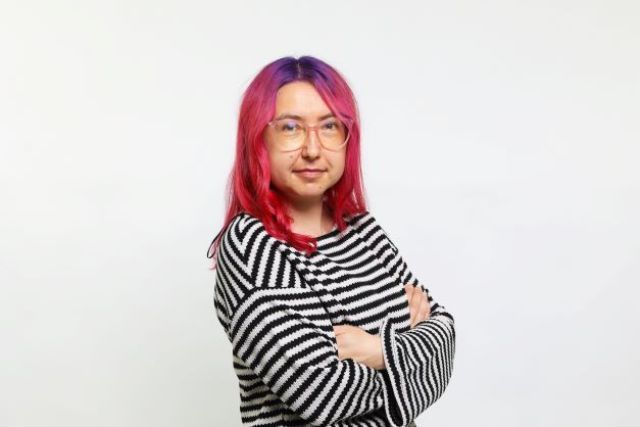 Karolina Ćwiek-Rogalska, fot. Leszek Zych, Polityka
She won the NCN Award for defining a new category of resettlement cultures in the research on post-displacement areas.
Karolina Ćwiek-Rogalska, fot. Leszek Zych, Polityka
She won the NCN Award for defining a new category of resettlement cultures in the research on post-displacement areas.
“I analyse whether, and if so, how, selected areas saw the emergence of new communities, which I refer to as ‘resettlement cultures’. I want to know what the new inhabitants did with things left behind by their predecessors”, she says. She has been looking for answers in archives, through participant observations and via interviews. “I treat the material relics of German cultures in Central Europe as ghosts that force one to interact with the continuing spectral presence of those who lived there before. This helps me understand the motivations of the new settlers and their actions”, she explains.
Ćwiek-Rogalska also won the ERC StG in 2021. She is currently working on an OPUS project funded by the NCN.
She says her research is about the “entanglement of time”, or the way in which the past continues to influence the present and the future. In her ERC project, she proposed a methodology based on hauntology, derived from the philosophy of Jacques Derrida. “Derrida shows that we are practically doomed to inherit; whether we want to or not, we always come after someone, we just exist after someone else, and our inheritance determines the shape of our future”, she adds.
Her study of resettlement cultures is part of a global debate now underway in memory and displacement studies. Ćwiek-Rogalska has completed fellowships at institutions such as Cambridge University, UCLA and Charles University in Prague.
She is also the winner of scholarships and fellowships of the Foundation for Polish Science, the former Ministry of Science and Higher Education, the Fulbright Foundation and the National Agency for Academic Exchange. Last year, she also won the Polityka Science Award.
She emphasises how much the NCN Award means to her. “First of all, it is an award that comes from the community; you cannot nominate yourself. For me to be here, someone had to name me as a candidate”, she says.
Therapeutic potential
Prof. Łukasz Opaliński from the University of Wrocław is a biotechnologist and molecular biologist. Together with an interdisciplinary research team, he looks into how healthy and cancerous cells transmit signals and transport macromolecules, and uses that data to design proteins with for potential use in therapies.
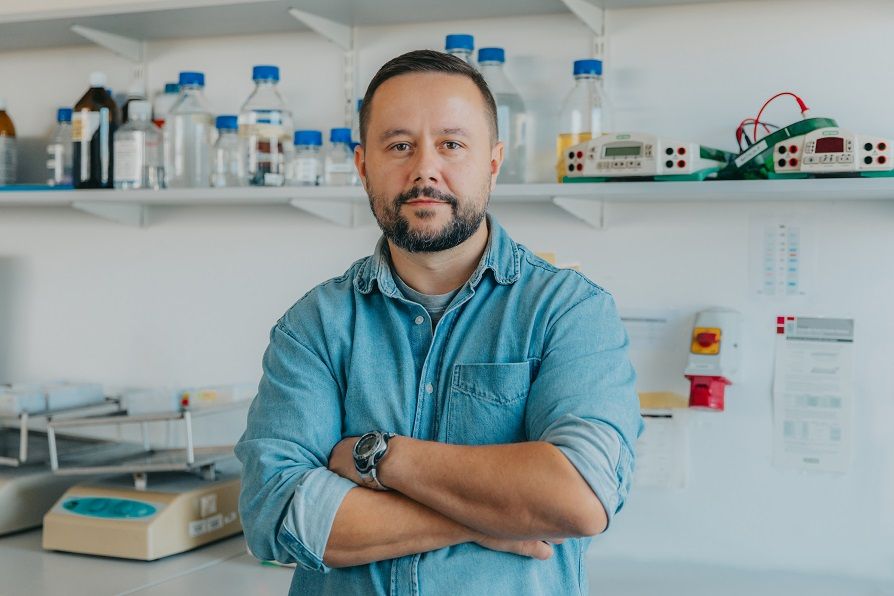 Łukasz Opaliński, fot. Dominika Hull-Bruska
He won his NCN Award for his investigation of the multivalent interactions between fibroblast growth factor receptors and natural and designed ligands for applications in research and medicine.
Łukasz Opaliński, fot. Dominika Hull-Bruska
He won his NCN Award for his investigation of the multivalent interactions between fibroblast growth factor receptors and natural and designed ligands for applications in research and medicine.
“In our research, we are trying to understand how our cells use fibroblast growth factor receptors (FGFR), which are among the most important cell surface receptors, to communicate in health and illness. We study how FGFR are activated and how their spatial arrangement on the cell surface influences their function and endocytosis. Once we get all this data, we use it to design and produce proteins with strictly defined properties that recognise FGFR and could serve as high-performance drug carriers in targeted cancer therapies”, Opaliński explains.
He argues that molecular biology opens up great growth opportunities for early-stage researchers. “Early-stage researchers can now use the knowledge they acquire through basic research to create concrete applications and products that may change human lives and improve our environment”, he says. A great case in point here are the gene therapies that treat previously incurable diseases, highly effective targeted cancer therapies with minimal side effects, plastic-degrading microorganisms and the highly effective and quickly delivered Covid-19 vaccines.
Prof. Łukasz Opaliński earned his PhD at the University of Groningen and completed a postdoctoral fellowship at the University of Fribourg. He has coordinated three NCN projects and one First TEAM FNP grant. He is also a winner of programmes launched by the European Molecular Biology Organization, as well as a Prime Minister’s Award for significant research achievement and the scholarship of the Ministry of Science and Higher Education for outstanding young researchers.
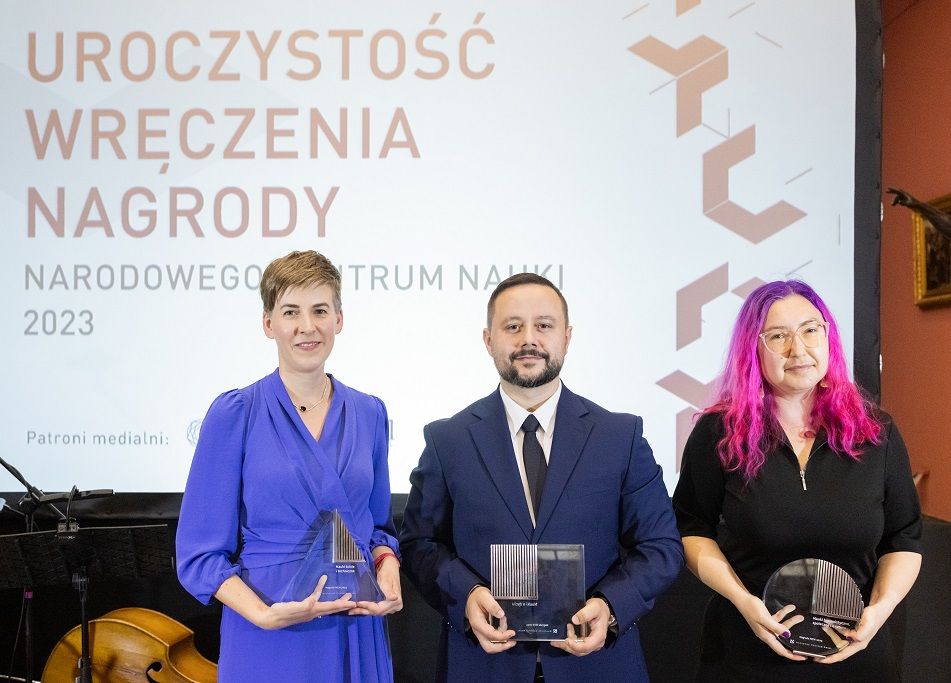 2023 NCN Award winners: Katharina Boguslawski, Łukasz Opaliński, Karolina Ćwiek-Rogalska
2023 NCN Award winners: Katharina Boguslawski, Łukasz Opaliński, Karolina Ćwiek-Rogalska
Each winner will receive 50 thousand zlotys. The 2023 award nomination procedure and criteria are explained in another article: 44 candidates in the running for the NCN Award.
The NCN Award is the subject of the latest episode of the NCN podcast. Our host, Anna Korzekwa-Józefowicz, talks to Dr Karolina Ćwiek-Rogalska and Prof. Joanna Golińska-Pilarek from the NCN Council about the changes in the award’s terms and conditions that come into force in 2024.
If you visit our website, you can also read an interview with Prof. Katharina Boguslawski, in which she addresses the issue of equal opportunities for men and women in science and talks about how to reconcile work and family roles.
The NCN awards ceremony was held under the auspices of Nauka w Polsce PAP and Forum Akademickie.
In November and December, the three winners will also deliver popular science lectures, which will be streamed live on the YouTube channel of the Copernicus Centre for Interdisciplinary Studies under the “Science in the Centre” series.
 Please join us at the EOSC Festival – the National Tripartite Event Poland during which we will discuss, inter alia, the Widening Countries’ perspective of the future of EOSC.
Please join us at the EOSC Festival – the National Tripartite Event Poland during which we will discuss, inter alia, the Widening Countries’ perspective of the future of EOSC. 





